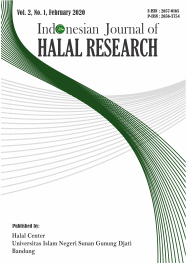The Effects of Haram Food on Human Emotional and Spiritual Intelligence Levels
DOI:
https://doi.org/10.15575/ijhar.v2i1.7711Keywords:
Haram Food, Halal food, Human Emotional and Spiritual IntelligenceAbstract
Muslims are taught to eat clean and safe food. Islam is very concerned about the source and cleanliness of food, how to cook, how to serve, how to eat to how to dispose of leftovers. The concept of Islam in food is actually the same as the concept of Islam in other respects, namely the concept that maintains the safety of the soul, body, and mind. Halal food is allowed because it benefits the mind and body. Conversely, bad food is not allowed because it will damage the mind and body. The research method used was descriptive qualitative research methods. Data obtained from a variety of literature that discusses The Effects of Haram Food on Human Emotional and Spiritual Intelligence Levels, both in the form of books and journals. Data collection techniques by means of literature study, data analysis needed in library studies obtained from a number of references in the form of books, journals, encyclopedias, documents and others that are considered to have a relationship and can support the solution of existing problems. Data was analyzed by using qualitative data analysis techniques. Halal food and haram both have a big influence on someone's life, both influential for morals, peace of mind, and fulfillment of prayer. People who always fill themselves with halal food, then the morals will be good, his heart will be calm and his prayers will be answered. Conversely, people who fill themselves with haram food will be bad in character, their hearts will be sick, and their prayers will not answered.
References
Abd al-Rahmân ibn Nashir ibn al-Sa’di, Taysîr al-Karîm al-Rahmân.
Abû al-Sa’ûd Muhammad ibn Muhammad ibn Musthafâ al- Imadî, Mufradât al-Qur’ân, versi Maktabah asy Syamilah
Abû Bakr Muhammad ibn ‘Abd Allâh Ibn al ’Arabî, Ahkâm al- Qur’ân, (Bayrut: Dâr al-Fikr, t.th
Abu Nu'aim, Hilyatul Auliya, Beirut: Darl Kitab, 1974, Jilid 7
Ahmad Muhaimin Azzet, Mengembangkan Kecerdasan Spiritual Bagi Anak, cet. 1, (Yogyakarta: Katahati, 2010)
Al-Ghazali, Ihya 'Ulum al-Din, jilid 2
Alvi Jauharotus Syukriya dan Hayyun Durrotul Faridah, Kajian Ilmiah Dan Teknologi Sebab Larangan Suatu Makanan Dalam Syariat Islam Journal of Halal Product and Research Volume 2 Nomor 1, Mei 2019
Ary Ginanjar A. dalam, ESQ, 10-27
Lembaga Penterjemah Hermes Malang, Emotional Intellegence; Pelayanan Sepenuh Hati, Jakarta: Pustaka Dela Prastasa, 1998
M. Quraish Shihab, Wawasan al - Quran , Bandung; Mizan, 2007
Muchtar Ali: Konsep Makanan Halal Dalam Tinjauan Syariah Ahkam: Vol. XVI, No. 2, Juli 2016
Muhammad ibn Jarîr ibn Yazîd ibn Katsîr ibn Ghâlib al-Amalî Abû Ja’far al-Thabari, Jami’ al-Bayân fi Ta’wil al-Qur’ân
Muhammad ibn Khalifah, Thalibul 'Ilmi bainal Amanah wat-Tahammul, [Kuwait: Gharas]: 2002, Jilid 1
Mulizar, Pengaruh Makanan Dalam Kehidupan Manusia Menurut Tafsir Al-Azhar, Jurnal At - Tibyan Vol. I No.1 Januari - Juni 2016
Purwoko, Tesis Pengaruh Makanan Haram Terhadap Perilaku Dan Tingkat Kecerdasan Emosional Dan Spiritual Siswa Ditinjau Dari Sudut Pandang Sufistik, Program Pascasarjana Iain Sunan Ampel Surabaya 2011
Rahmi Yuningsih Aspirasi Perlindungan Konsumen Dari Dampak Buruk Makanan Tidak Halal Bagi Kesehatan, Vol. 1 No. 2, Desember 2010
Siti Zulaekah dan Yuli Kusumawati, Halal dan Haram Makanan dalam Islam, Jurnal Suhuf, Vol. XVII, No. 01/Mei 2005
Sulaiman ibn Ahmad, al-Mu'jam al-Ausath, jilid 6
T. Hermaya Kecerdasan Emosinal, (Jakarta: Gunung Mulia, 1999), 13.
Yûsuf al-Qaradhawî, Al-Halâl wa al-Harâm fi al-Islâm, Terjemah Wahid Amadi dkk, Halal Haram dalam Islam
Downloads
Published
How to Cite
Issue
Section
Citation Check
License
Copyright (c) 2020 Indonesian Journal of Halal Research

This work is licensed under a Creative Commons Attribution-ShareAlike 4.0 International License.
Authors who publish in Indonesian Journal of Halal Research agree to the following terms:
- Authors retain copyright and grant the journal right of first publication with the work simultaneously licensed under a Creative Commons Attribution-ShareAlike 4.0 International (CC BY-SA 4.0) License that allows others to share the work with an acknowledgment of the work's authorship and initial publication in this journal.
- Authors are able to enter into separate, additional contractual arrangements for the non-exclusive distribution of the journal's published version of the work (e.g., post it to an institutional repository or publish it in a book), with an acknowledgment of its initial publication in this journal.
- Authors are permitted and encouraged to post their work online (e.g., in institutional repositories or on their website) prior to and during the submission process, as it can lead to productive exchanges, as well as earlier and greater citation of published work (See The Effect of Open Access).

Indonesian Journal of Halal Research by Halal Center UIN Sunan Gunung Djati Bandung is licensed under a Creative Commons Attribution-ShareAlike 4.0 International License.
Based on a work at https://journal.uinsgd.ac.id/index.php/ijhar.

















